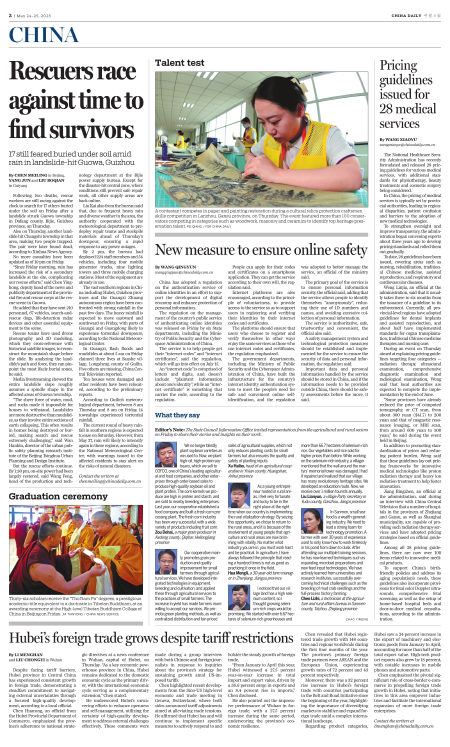




Editor's Note: The State Council Information Office invited representatives from the agricultural and rural sectors on Friday to share their stories and insights on their work.
We no longer blindly plant soybean varieties as we used to. Now, we plant high-oil, high-protein soybeans, which we sell to COFCO, one of China's leading agricultural and food companies, and other enterprises through order-based sales to produce high-quality soybean oil and plant protein. The corn kernels we produce are high in protein and starch, and are sold to nearby breeding enterprises. Last year, our cooperative established a food company and built a fresh corn processing plant. The fresh corn industry has been very successful, with a wide variety of products including fruit corn.
Zou Dehai, a major grain producer in Kedong county, Qiqihar, Heilongjiang province
Our cooperative mainly promotes grain production and quality improvement for small farmers through agricultural services. We have developed integrated technologies in equipment, breeding and cultivation, and applied these through agricultural services to the practices of small farmers. The increase in yield has made farmers more willing to accept our services. We promote green planting methods, as well as centralized distribution and fair-priced sales of agricultural supplies, which not only reduces planting costs for small farmers but also ensures the quality and safety of planting inputs.
Xu Haibo, head of an agricultural cooperative in Yixian county, Huangshan, Anhui province
As a young entrepreneur rooted in rural areas, I feel very fortunate and lucky to be in the right place at the right time when our country is implementing the rural vitalization strategy. By seizing this opportunity, we chose to return to the rural areas, and it is because of the involvement of young people that agriculture and rural areas are now brimming with vitality. No matter what industry you are in, you must work hard and be practical. In agriculture, I have always followed the principle that reading a hundred times is not as good as practicing it once in the field.
Hua Mengli, a 30-year-old farm manager in Zhenjiang, Jiangsu province
I noticed that our village land has a high selenium content, so I thought growing selenium-rich crops would be promising. We started with over 6.67 hectares of selenium-rich greenhouses and more than 66.7 hectares of selenium-rich rice. Our vegetables and rice sold for higher prices than before. While working on the selenium-rich industry, a villager mentioned that the wall around the martyrs' memorial tower was damaged. I had it repaired and realized that our village has many revolutionary heritage sites. We developed an education route. Now, we receive over 1 million tourists annually.
Liu Lianyun, a village Party secretary in Yudu county, Ganzhou, Jiangxi province
In Sanmen, small seafood is a wealth-generating industry. We need to lead a strong team for technology promotion. A farmer with over 30 years of experience used to only know how to work tirelessly in his pond from dawn to dusk. After attending our multiple training sessions, he has now learned techniques such as expanding microbial preparations and new feed input technologies. We have actively learned from universities and research institutes, successfully overcoming technical challenges such as the breeding of mud crab seedlings and the full-process factory farming.
Chen Lizhi, a technician at the agriculture and rural affairs bureau in Sanmen county, Taizhou, Zhejiang province

